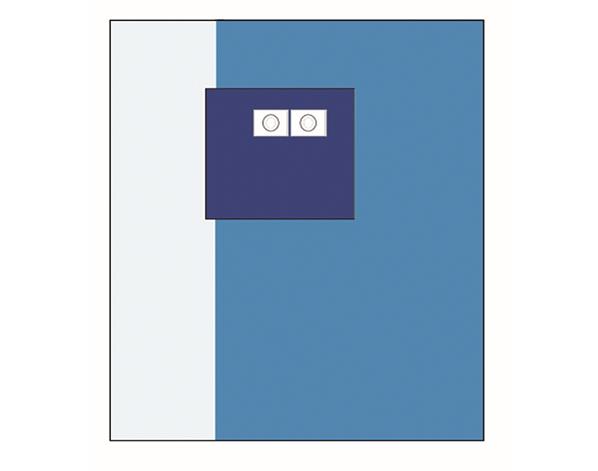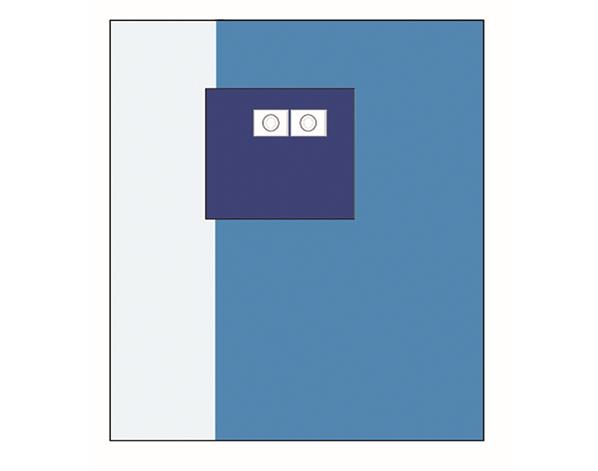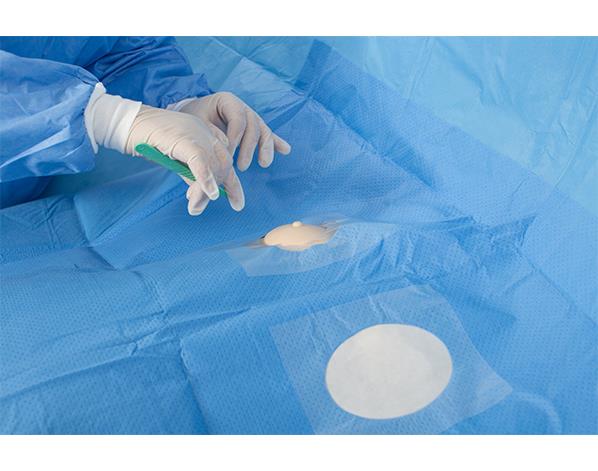Angiography Drapes
| Name: | Angiography Drapes |
| Model No.: | Angiography Drapes |
| Material: | SMS, Bi-SPP |
| Packaging: | Individual packed in paper&plastic sterile bag, or customized packing |
| Product description: | Disposable and EO sterilizable |
| MOQ: | 1000pcs |
| Sample: | Available |
| Lead time: | 3 days |
| Keywords: | Angiography Drapes,Angio Drapes,Custom Angiography Drapes,Angio Surgical Drapes,Top Angiography Drapes Supplier |
| Country of Original: | China |
| Port: | Qingdao |
| Stock: | Available |
| Factory Address: | Changyuan,China |
| Office: | Zhengzhou,China |
| Inquiry |
Product Description
·Absorbent reinforcement73x112cm
·Fenestration,dual circular,15cm with circular incise aperture,9cm
·Single clear side panel on patient's right side
Products: Angiography drape
Measure: Regular size or customized
Material: Could be made with SMS, Bi-SPP Lamination fabric, Tri-SPP Lamination fabric, Bi-Viscose Lamination fabric, Tri- Viscose Lamination fabric, PE film, SS
Feature: Disposable and EO sterilizable
Usage: It is used in the operation room for angiography of surgery, the product is no irritation, no toxicity and inodorous to human, there is no energy and no side effect to body. Can be used to improve the ease, efficiency and safety of surgical procedure,
meanwhile Reduced the risks of accidental cross infection
Packaging: Individual packed in paper&plastic sterile bag, or customized packing

Angiography drapes are specialized sterile covers used during angiographic procedures to maintain a sterile environment and protect both the patient and medical staff from contamination.
Purpose and Use
Sterility: They help ensure that the area around the surgical site remains sterile.
Protection: They protect the patient from infection and shield medical equipment from contamination.
Material and Design
Composition: Typically made from non-woven, absorbent materials that are resistant to fluids.
Features: Often include adhesive edges to secure the drape in place and may have openings for access to the surgical site.
Applications
Commonly used in various angiographic procedures, including catheterization and imaging of blood vessels.
Essential in both diagnostic and interventional radiology settings.
Regulatory Standards
Must meet specific medical standards for safety and effectiveness, often regulated by health authorities.
These drapes are crucial for maintaining hygiene and safety during procedures that involve invasive access to the vascular system.
Angiography drapes are sterile, disposable sheets used in medical procedures to create a sterile field, protect personnel from fluids, and provide a controlled environment for vascular access. They are designed with multiple access points or openings (fenestrations) for instruments, often featuring adhesive backing to secure them to the patient, clear panels for visibility, and absorbent materials to manage fluids and prevent infection.
Purpose of Angiography Drapes
Infection Control:
They form a critical barrier layer to prevent cross-contamination and maintain a sterile environment around the surgical site.
Fluid Management:
Made from highly absorbent materials like SMS (Spunbond-Meltblown-Spunbond) fabric, they manage fluids generated during the procedure.
Patient Protection:
They protect the patient and the sterile field from the spread of infection.
Procedural Flexibility:
Drapes come with various access points for different injection and access types, such as femoral (leg) or radial (arm) access.
Key Features
Sterility:
They are sterile to ensure aseptic conditions during the procedure.
Absorbency:
Designed with high-capacity absorbent materials for effective fluid control.
Adhesive Backing:
Often feature adhesive strips or film to prevent slippage and securely hold the drape in place.
Fenestrations:
Integrated openings or "windows" allow for instrument access and flexibility to adapt to the patient's anatomy and the chosen vascular access point.
Visibility:
Some drapes include clear panels or screens to allow medical staff to see the patient and the instruments.
Disposable:
They are single-use items, preventing the need for sterilization between procedures.



 Send Email
Send Email